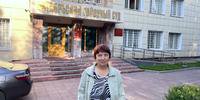The Case of Oleynik in Novosibirsk
Filter
- #
The Investigation Department of the FSB of Russia for the Novosibirsk Region is initiating a criminal case against three believers - Alexander Seredkin, Valery Maletskov and Marina Chaplykina.
On the same day, a series of searches of believers, including 67-year-old Tatyana Oliynyk, took place.
- #
Judge of the Oktyabrsky District Court of Novosibirsk Yevgeny Zakharov recognizes as lawful the search in Oleinik's home, authorized by the investigator.
- #
FSB investigator E. Selyunin singles out materials against Tatyana Oleinik in a separate proceeding.
- #
A criminal case is being opened against the believer under Part 2 of Article 282.2 of the Criminal Code of the Russian Federation. According to investigators, Oleinik's extremist actions boil down to the fact that she provided her apartment and electronic devices for religious meetings with fellow believers, and also participated in worship services herself.
- #
Tatyana Oleinik is summoned to the investigation department of the FSB to familiarize herself with the decision to initiate a criminal case and interrogate her as a suspect. The believer uses Article 51 of the Constitution of the Russian Federation.
- #
Tatyana Oleinik's case is submitted to the Oktyabrsky District Court of Novosibirsk. It will be considered by judge Marina Borzitskaya.
- #
The defendant is charged. She expresses her disagreement with him and does not admit her guilt.
- #
FSB officer G. G. Lazarev is being interrogated. He says that Oleinik "provided active assistance to Alexander Seredkin", providing her housing for worship and was an "informal leader." The witness finds it difficult to answer the clarifying questions of the defense.
- #
Two witnesses are being interrogated, who report that a lot of time has passed since the events discussed, and therefore they do not remember the details well.
Immediately after the end of the hearing, the judge, turning to a lawyer, declares that he wants to complete the trial in August. During one session, Judge Marina Borzitskaya plans to examine 10 volumes of the case, interrogate the secret witness and the defendant, hear the arguments of the parties and the last word and pass a verdict.
The lawyer notes that such a procedure for holding a meeting violates the principle of adversarial parties.
- #
The court proceeds to examine the written materials of the case. Within 20 minutes, the prosecutor voices 9 volumes, only naming the documents. Only after the lawyer's request to record this violation in the record of the court session, the prosecutor begins to briefly explain the essence of the materials being examined.
The defense draws the court's attention to the document "Information on the Fundamentals of the Doctrine of Jehovah's Witnesses," which states that the followers of this religion build their lives in accordance with biblical teachings and that the basis of worship is the study of the Holy Scriptures.
Tatyana Oliynyk reads out her written notes in which she explains that she is a believer and therefore considers her accusation of extremism far-fetched, because "Jehovah's Witnesses are known for their peacefulness." The woman says that she was left without a mother early, and therefore she had to learn to live and provide for herself on her own. She also tells the court that she has a number of chronic diseases.
- #
The last word of the defendant Tatyana Oleinik in Novosibirsk
